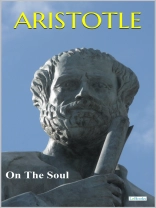Aristotle (384 BC–322 BC) was an important Greek philosopher, one of the most influential thinkers in Western culture, having been a disciple of the philosopher Plato. Aristotle developed a comprehensive philosophical system in which he pondered practically all existing subjects, such as geometry, physics, metaphysics, botany, zoology, astronomy, medicine, psychology, ethics, drama, poetry, rhetoric, mathematics, and logic. ‘On the Soul’ (in Latin, De Anima) is a text by the Greek philosopher Aristotle of Stagira, composed of three books, and there are no doubts about the authenticity of the work. In ‘On the Soul, ‘ Aristotle's objective is to analyze the main problems concerning the soul, which is the vital principle of every living being. Book I consists of an introduction and contextualization of the theme; Book II presents analyses on the relationship between soul and body, the faculties of the soul, nutrition, and sensation; in Book III, Aristotle discusses imagination and thought, as well as the relations between sensation and intellect. It is also in this treatise, specifically in Book III, that the philosopher presents his influential theory of active intellect and passive intellect.
A propos de l’auteur
Aristotle (384-322 BC) was an important Greek philosopher, one of the most influential thinkers in Western culture. He was a disciple of the philosopher Plato. Aristotle developed a philosophical system that addressed practically all existing subjects, such as geometry, physics, metaphysics, botany, zoology, astronomy, medicine, psychology, ethics, drama, poetry, rhetoric, mathematics, and primarily logic. Aristotle was born in Stagira, in Macedonia, a Greek colony, in the year 384 BC. Son of Nicomachus, physician to King Amyntas III, he received a solid education in Natural Sciences.












